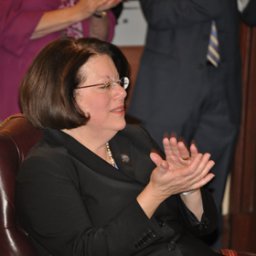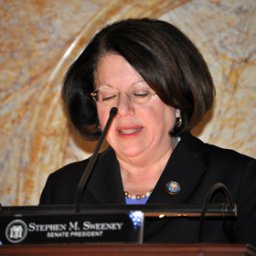‘Thomas P. Canzanella Twenty First Century First Responders Protection Act’ Provides Coverage for Emergency Workers Whose Symptoms and Illnesses May Appear Years After Incidents
TRENTON – A bill sponsored by Senator Linda R. Greenstein that will ensure New Jersey’s first responders receive medical care and compensation for conditions resulting from their actions in the line of duty, particularly medical conditions that may not manifest until long after the event, was approved today by the Senate Labor Committee.
“While most everyone tries to stay out of harm’s way, first responders run into danger when a terrorist attack or catastrophic event occurs,” said Senator Greenstein, D-Middlesex and Mercer. “In doing so, they take on a high level of risk, not only of immediate injury or death, but long-term health problems including respiratory issues, cancer and post traumatic stress disorder. We cannot ignore that these health problems have a direct correlation to high risk emergency situations and it is our duty to provide these men and women with the compensation and health care they have earned.”
The bill, S-1778, would create a rebuttable presumption for workers’ compensation coverage – shifting the burden of proof from the employee to the employer – for any death or disability, including post traumatic stress disorder, that arises from the physical or psychological impact of stress or injury experienced by the public safety worker during response to a terrorist attack, epidemic or other catastrophic emergency. If a first responder is exposed to pathogens or biological toxins, hazardous chemicals, cancer causing radiation or radioactive substances or witnesses death and suffering of a magnitude sufficient to cause significant psychological trauma during a catastrophic event, they would be able to receive workers’ compensation including wage replacement and medical benefits. The bill would apply to both paid and volunteer firefighters, first aid or rescue squad members, police, corrections officers, nurses, medical technicians and other medical personnel.
“Emergency personnel can witness traumatic events such as death and extreme suffering while responding to attacks on American soil. The severity of these incidences can have a mental toll, such as post traumatic stress disorder, that may manifest years after these incidents. With this change in law, we can make certain that these heroes are able to receive the care they need to recover successfully,” said Senator Greenstein.
The September 11 attacks on the World Trade Center in New York caused thousands of tons of toxic debris to enter the air in the aftermath of the attacks, leaving emergency responders and individuals in the area susceptible to increased health risks. Research into these toxins’ effects on rescue workers has been well documented. A Memorial Sloan-Kettering Hospital doctor cited a 70 percent illness rate among first responders; a 2010 report of 14,000 rescue workers found that on average workers lost 10 percent of their lung function. Further, a 2012 study by the Journal of American Medical Association reported that the incidences of prostate cancer, thyroid cancers and multiple myeloma was elevated among 9-11 rescue workers; and a recent Journal of Environmental Health Perspectives study found a 15 percent overall increased risk of cancer in World Trade Center rescue and recovery workers.
“In a post-September 11 age, first responders are more often exposed to toxic substances, including biological and chemical warfare, from which the effects may not appear for years or even decades. Our current system of immediate cause and effect no longer applies,” said Senator Greenstein. “This legislation recognizes that and ensures that no matter when symptoms occur, our firefighters, police, health care workers and emergency personnel are protected.”
Due to the extreme likelihood of repeated smoke and carcinogenic exposure, the bill would provide that any firefighter with five or more years of service would receive a rebuttal presumption for workers’ compensation if they suffer an injury, illness or death caused by cancer.
The legislation is named after the late Thomas P. Canzanella, a Hackensack firefighter who spent several weeks at Ground Zero after 9-11 and championed coverage of firefighter occupational diseases, including cancer.
The bill was approved by the Committee with a vote of 3-0-2. It now heads to the full Senate for consideration.



